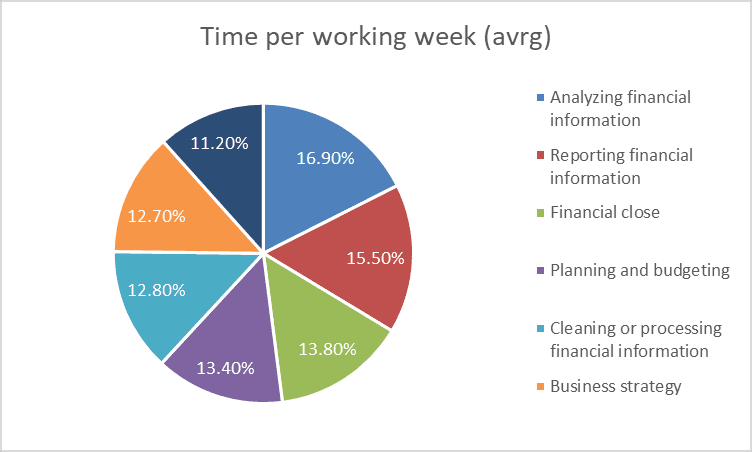
The whitepaper is based on responses from 336 finance and IT leaders with 88% from North America and Europe, roughly half from each, and the remainder from APAC. Its key finding is that 90% of respondents still struggle with the financial close process. The authors believe due to the complex mix of ERP solutions in use. On average, each organisation had 18 instances from 9 different vendors.
The Trintech answer is the adoption of AI-enabled close management software which can automate and accuracy in the financial close process.
The current landscape
The authors acknowledge that the responses, obtained during May, amid lockdowns are subject to change. The whitepaper seeks to establish a baseline of business priorities and the current state of the technology landscape within the responding organisations. The top three priorities in May were
- Reduce overall costs (37%)
- Drive digital transformation (34%)
- Better analytics and insights (33%)
They also asked about the current applications in use within finance. Financial reporting was only in use by 70%. Despite being the highest, it demonstrates that spreadsheets are still widely in use. However, things are changing. 86% of those not using financial reporting are planning to do so in the next two years. Other notable financial software usage includes:
- Financial Transaction matching (51%) (the second highest)
- Close process and task management (37%)
Less than 42% use any all type of software to assist with the financial close despite the multiple ERP solutions in use mentioned earlier. At least 67% of respondents believe they will invest in these kinds of software within the next two years. If this survey is carried out in two years, it will be very interesting to see whether that is the reality. It would mean that 95.8% will use financial reporting in 2022.
The challenges
In a similar finding to the Workday whitepaper, the author found that a lack of data accuracy stifles strategy. This, coupled with a lack of synchronisation between disparate ERPs and collaboration between execs, notably the CFO and CIO hinders finance transformation. It acknowledges that solution is a single data platform but argues that this is often time-consuming and expensive.
Not all organisations can afford or are able to consolidate onto a single ERP platform. For finance, Trintech believes that by improving the financial close process, organisations can realise many of the benefits of digital transformation without the associated cost and risk of major projects. In time, as business units change ERP, they seamlessly slot into modern consolidating close management software with little effort.
The study also looked at the problems that finance leaders are facing. Three key issues faced during the financial close were:
- Manual errors (44%)
- Time taken (42%)
- Lack of technology to support the process (36%)
The allocation of time spent by CFOs was insightful. Only 12.7% spend on business strategy, which means over 80% is work that automation would help to reduce, in some cases substantially.

Tackling the issue
The authors argue that better collaboration between C-level execs and the next generation of financial management technology can address the challenges.
The authors see improving collaboration between execs, specifically the CFO and CIO as key to success. CIOs can assist through their understanding of and skills to implement AI solutions. CFOs need to work with CIOS to establish the key metrics they need to improve within finance generally and close management specifically. Without that analysis of their real business requirements, the software deployment can lose focus on objectives and not realise the full potential value.
Better technology means artificial intelligence and machine learning. Respondents said: “80% of respondents said AI will play a large or central role in their organization’s next wave of financial management technology.”
Multiple benefits are seen by adopting AI. The top three were:
- Faster speed 62%
- Reduced manual effort 61%
- Better accuracy 60%
The core question for Trintech was to identify the requirements for close management solutions that address the challenge. Top of the list is the ability to integrate to multiple ERPs (36%).
The authors close with four recommendations:
- Organizations need to make bold investments in finance for business survival and growth.
- The right technology will bring consistency and automation to critical financial processes.
- Make sure to invest in governance and CFO-CIO collaboration for the best results.
- Push the limits of AI in core finance processes.
Enterprise Times: What does this mean
This research has a completely different focus from the Workday whitepaper and both have value. Workday posits the theory that a single data source can provide the answers and benefits of modern finance technology. It achieves that by drawing in data from multiple sources, which can be a two-tier ERP hierarchy.
The Trintech close management solution does not require such as major transformation. Instead, it provides the integration and overlay that enables finance functions to achieve better accuracy and a more efficient financial close.
The key message for this whitepaper is that the close management solution, not only needs to integrate into multiple ERPs, it also needs to leverage AI fully. Critical to success, though, is the change management that needs to happen within organisations and the removal of walls between the IT and Finance functions.

Teresa Mackintosh, CEO at Trintech commented: “Prior to the pandemic, we heard many business leaders say digital transformation is a priority, but too many overlook finance as a crucial and foundational element of this transformation. Investing in the right technology to maintain business continuity in a remote environment and beyond is no longer a “want”, it’s a critical need.
“This survey revealed that complex ERP environments hinder the ability to produce necessary financial statements and track key metrics to get a true view of the business. Looking to supplemental solutions that integrate across these complex ERP environments to ensure data accuracy, automation, and collaboration in the C-Suite are paramount to ensuring long-term success for your organization.”


























